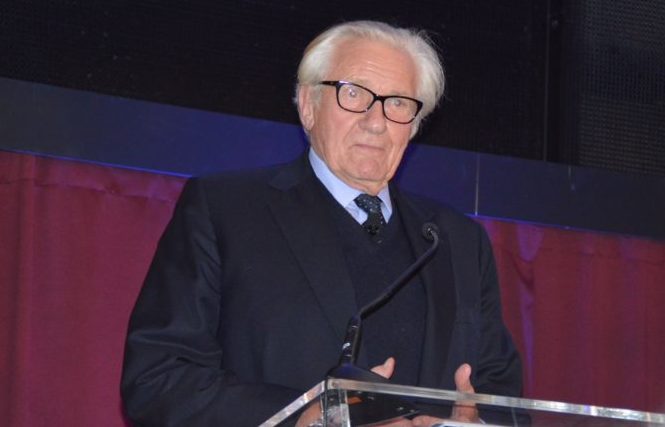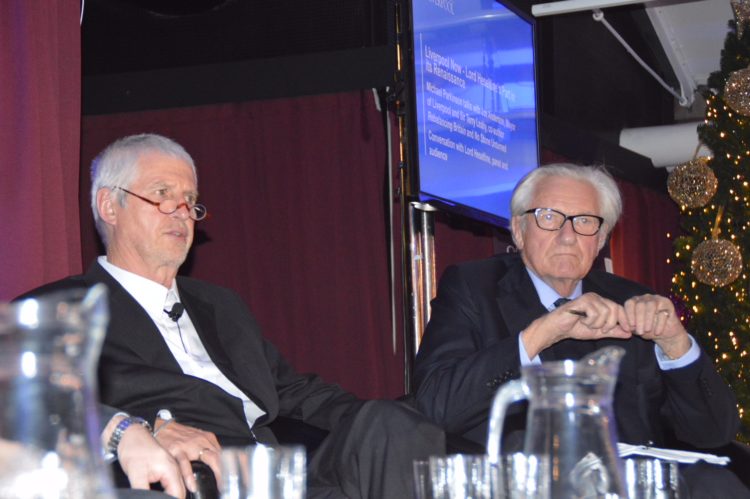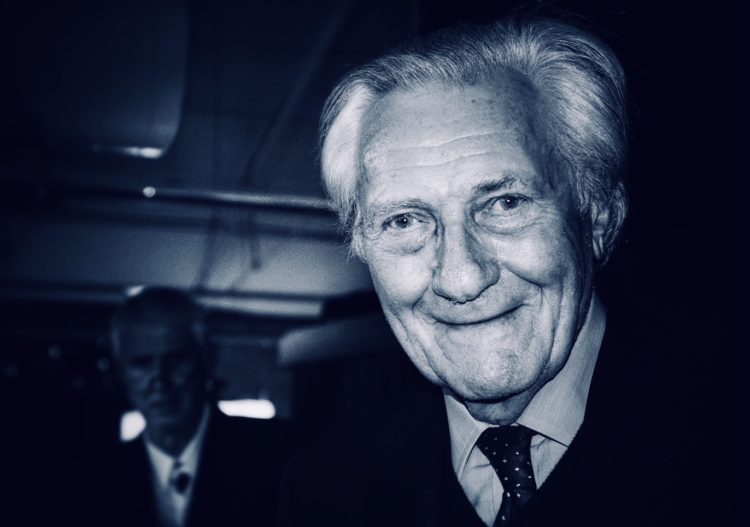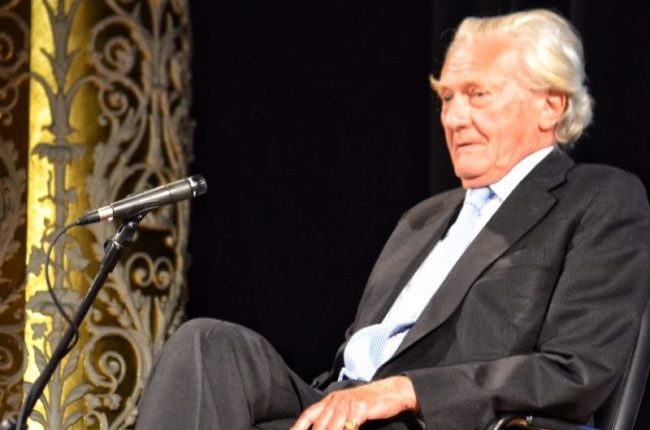Sir Terry Leahy, Professors Janet Beer and Michael Parkinson, Lord Prescott and Mayor Joe Anderson honour former ‘Minister for Merseyside’ at University of Liverpool event. Tony McDonough reports

It was arguably the lowest point in Liverpool’s history. Decades of industrial decline and an era of mass unemployment, grinding poverty and institutional racism all came together in an explosive few nights in Toxteth in the summer of 1981.
The riots shocked a city and those shockwaves reached the Cabinet room of a Conservative Government in Westminster that was already seemingly adept at alienating people living in Britain’s decaying inner cities.
Force of nature
To this day the then Prime Minister Margaret Thatcher is despised in Merseyside and she and many Conservatives saw Toxteth as a law and order issue; but one man, then Secretary of State for the Environment Michael Heseltine, took a different view.
Almost a force of nature, the now Lord Heseltine saw an opportunity to revive Merseyside’s shattered communities and to set a once great city on a path of economic renaissance.
Special event
Lord Heseltine’s role in Liverpool’s rebirth was celebrated in a special event at the city’s Maritime Museum, organised by the University of Liverpool. The university is home to the Heseltine Institute.
Speakers included the university’s vice-chancellor, Prof Janet Beer, Prof Michael Parkinson, former Tesco chief executive Sir Terry Leahy, Liverpool Mayor Joe Anderson, Liverpool Vision chief executive Max Steinberg and former Labour Ministers Lord Prescott and Lord Adonis.
Sir Terry, who co-authored a report with Lord Heseltine that led to Liverpool’s International Business Festival, said the ‘Minster for Merseyside’ had been a key figure in making Liverpool credible again in the eyes of investors.
“You would have been laughed out of any boardroom in the 1980s if you suggested investing in Liverpool,” Sir Terry told those assembled. “We have ended up bringing in £4bn of investment and a growth in confidence that all started with Michael Heseltine in the 1980s.”
Collective skills
At the end of the afternoon-long event, Lord Heseltine addressed the audience and gladly accepted the many plaudits that had come his way – similar to many visionaries and dynamic leaders Hezza, as he is affectionally known in these parts, was never a man encumbered by false modesty.
But he also went to great lengths to illustrate that it was not individuals such as he who had the power to deliver seismic change – but the people on the ground and their collective skills and talents.
Lord Heseltine was an enthusiastic proponent of regional and community-level devolution decades before the word had even entered the mainstream political lexicon. Not for him the top down approach of Government-knows-best.
The men and women of Whitehall are mere enablers whose job it is to give people the space and opportunity to create their own “ladders of aspiration”, he said.

“200 years ago Liverpool was at the centre of the greatest empire the world has ever seen and that came about not because someone in London came here to tell people how to do it,” Lord Heseltine explained.
“You can see Government as responsible for ensuring that standards are set where it is appropriate. And then they are to preoccupy themselves to ensure those standards are met. But they must leave it to others to conduct the exercise as close as you can to the people who are affected by the policies. That is a simple analysis of my philosophy.
“We can’t all be doctors, we can’t all be lawyers and we can’t all be bricklayers but we are all part of a community and we all have a huge range of skills.
“The more that you can draw on those skills and exploit them the more likely it is you are to have a successful economy. In the end successful economies are the beginning and end of creating the living standards upon which we all depend.”
It Took A Riot
Lord Heseltine has authored and co-authored a number of published reports on economic regeneration but perhaps his most important study was one that was not published at the time.
Entitled It Took A Riot, the study was for the eyes of Mrs Thatcher and his Cabinet colleagues and illustrated the deep-rooted problems of inner city Liverpool in the early 1980s.
“It had a shocking title and I did that deliberately. I wanted to shock,” he added.
“Robert Armstrong who was secretary of the Cabinet at the time, said of my team we were ‘men possessed’ and that it has absolutely overtaken us. Yes, the horror of the vacuum. The absence of any sense of strength, resilience, determination, the will to fight back.”
Uncomfortable truth
Returning to his central theme, Lord Heseltine offered perhaps an uncomfortable truth for those assembled at the event that, for many of them, Merseyside’s deprived communities were an abstraction that they did not experience first-hand.
He said: “What is a deprived community? You know where they are but you don’t actually go there and I don’t think many of you live there. It is not the middle class culture that is so easily defined – work hard, save, get on the ladder.
“The ‘heroes’ in the areas of high unemployment are the gang leaders. You are dealing with a totally different culture and people that are largely forgotten.

“I had the simplest philosophy – show me the problem, show me the person in charge. And then usually you find out what the problem actually is… the person in charge.
“I asked one council leader what role the teachers at one of the schools was going to play in a particular project and he replied ‘it’s ok Secretary of State we will tell them’. That was the point that he had lost, that he was behaving just like we in London behave. He was going to tell them the solution.”
Industrial strategy
Lord Heseltine said there had been progress in engaging communities but said it had not yet gone far enough adding that with our imminent withdrawal from the EU it was more important than ever for Britain to have a plan for growth that involved people at all levels.
He added: “The philosophy that I learned here in Liverpool was try to find identifiable communities and try to engage with them to bring about a better improvement in their living standards.
“I am absolutely convinced, Brexit or no Brexit, we still need an industrial strategy. Not just about manufacturing but for the whole economy and the purpose has to be to devolve far more of what London now administers itself to local economic and viable areas.
‘Common accord’
“Liverpool now has two Mayors. In my wildest dreams I never thought we would have a city and a city region mayor and this is a personal challenge to some people which I have no doubt they will wrestle with and, in the greatest interests of the area, they will find a common accord.
“Devolution – trust people, enthuse people and be, above all else, world competitive. Find out what the standards are you are up against in the rest of the world. You have to confront ministers with the truth and make them quality obsessed.
“Be sure when they distribute their power they distribute it competitively and local agencies, whether they be councils, LEPs, private sector vehicles or universities, have got to deliver promises about what they will achieve and be measured by results and end entitlement assumptions – which means money just keeps flowing.
“It is a harsher world, but frankly, the world is getting harsher by the day.”

